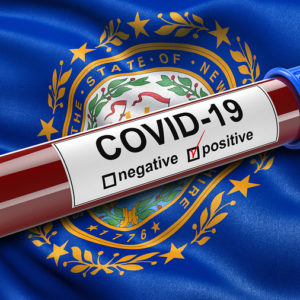COVID-19 is one of the deadliest viruses in the modern era, already mutating into new forms that are confounding public health experts and most advanced medical technology. But there’s one force even the coronavirus pandemic cannot defeat:
Politics.
On Monday morning, the New Hampshire Health and Human Services spokesman Jake Leon was on NHPR defending the state’s completely reasonable public health policy regarding part-time residents. Like some other states, New Hampshire allows people in the high-risk Phase 1B group to get vaccinated even if they aren’t residents of the state but own property here, like a vacation home.
“The intent of the vaccination plan is to make it as easily and efficiently as possible for people in NH to get vaccinated, not to throw up barriers,” Leon said.
By the COB Monday, the Sununu health department had done a full reverse.
“Today, the New Hampshire Department of Health and Human Services updated and clarified the state’s FAQs to note that only New Hampshire residents are eligible to receive the vaccine in the state of New Hampshire,” they said in a press release. “You will now need a current NH Driver license or a recent pay stub showing you’re a resident of the Granite State.”
What happened?
Democrats went after Sununu, suggesting the policy was a form of favoritism toward Waterville Valley, the popular resort owned by the Sununu family.
“.@GovChrisSununu is giving the life-saving COVID vaccine to the out of staters who own property near his ski resort, while our teachers, grocery store workers, and many residents in long-term care facilities are waiting on the COVID vaccine,” the New Hampshire Democratic Party’s official Twitter account alleged on Monday.
Former state Democratic Party Chair Kathy Sullivan accused Sununu of putting “Waterville Valley condo owners ahead of teachers.”
And so the Sununu administration backed down. But what about “follow the data?” Is leaving high-risk people unvaccinated because they left Long Island for their house on Lake Winnipesaukee smart public health policy?
Maine, Vermont and New Hampshire have the highest percentages of vacation homes in the nation, as ranked by percentage of the state’s housing stock, according to investment property exchange firm IPX 1031.
Maine’s public health officials struggled with the issue earlier this month, the Portland Press Herald reported, before ultimately deciding to restrict the vaccine to pertinent residents only. State officials said they want to include seasonal residents in the vaccination program, but are waiting to receive more doses from the federal government. Vermont also restricts vaccines to residents.
Arizona, Florida and North Carolina, on the other hand, allow non-resident property owners to get the vaccine. According to North Carolina’s guidance, the Centers for Disease Control and Prevention has instructed states that they may not impose residency restrictions for COVID vaccination.
In Colorado, not only can second-home owners get the vaccine, but Gov. Jared Polis ordered providers not to ask for IDs to ensure that non-citizens will be vaccinated, too.
And then there’s this question for New Hampshire Democrats: Do you really want illegal immigrants living in New Hampshire to be denied the vaccine due to lack of legal proof of residency?
After weeks of frustration over the distribution of vaccines — Operation Warp Speed has been cranking out more than a million doses per day, but states have been getting them into arms at less than half that rate — a consensus is building that the best strategy is to simply target high-risk people, particularly the elderly. Israel emerged as the gold standard for vaccinations in part by handing out shots based on age.
The real concern from this story is that the right way to protect public health had nothing to do with the final decision. It was politics. Democrats attacked, Sununu retreated.
Interestingly, he hasn’t retreated from the Democrats’ anti-science position on vaccinations for teachers. He’s made the case forcefully that the data don’t justify taking vaccines from elderly people with pre-existing conditions and giving them to healthy, 30-year-old teachers in classrooms where, the science shows, spread is extremely rare.
At the same time, Sununu has set aside data when it comes to race. Over the summer, he encouraged people to participate in large gatherings on behalf of Black Lives Matter during a lockdown that kept loved ones from gathering for weddings or funerals. And he acknowledged at the time that public health wasn’t his priority in making that decision.
Today, as the debate goes on over teachers or vacation homeowners getting into the Phase 1B group, the Sununu administration has set aside 10 percent of Phase 1B vaccines for people of color — in a state where the high-risk group is 95 percent white.
Once again, not science — politics.
Meanwhile, the demand for vaccines in the Granite State continues to far outstrip the limited supply, with or without the handful of non-resident property owners. “Since Friday, just under 200,000 citizens signed up for the vaccination as part of Phase 1B, and over 60 percent of those have already scheduled a location and time for their first shot,” Sununu said in a statement late Monday.
More than 325,000 people are in the Phase 1B group. The state is currently receiving an average shipment of 17,000 doses per week. At that rate, it will take more than 19 weeks to get these shots into arms.
“The rollout of the COVID-19 vaccine is one of the largest logistical undertakings our state has ever faced. Our teams are working around the clock and our systems have worked as designed and ahead of schedule,” Sununu said. “New Hampshire is ready to administer the vaccinations as fast as the federal government supplies it.”

